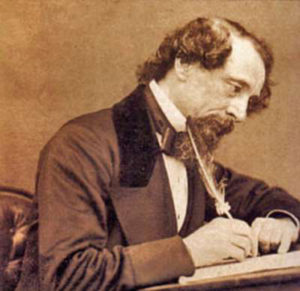Unknown Brief About Charles Dickens’ Journalism
When people mention Charles Dickens, even those who have no firsthand experience reading his novels are likely to have heard of the miserly Ebenezer Scrooge, the poor orphan Oliver, or the spinster Miss Havisham. Indeed, Dickens’s fictional characters have survived the test of time, continuing still to make their appearances in popular culture today. It is a lesser known fact, however, that Dickens began his career as a reporter, and was furthermore one of the most famous journalists of the Victorian era. The following chronicles three important stages of Dickens’s journalistic career.
Dickens as a Parliamentary Reporter (1831-1833)
At barely twenty years of age, Dickens began his career as a reporter for a newspaper called The Mirror of Parliament in 1831. Dickens worked hard to master the demanding skills of short-hand note-taking, adapting himself to the fast-paced world of parliamentary reporting and making himself known as one of the fastest and most reliable reporters at the paper.
Gradually, Dickens made his way upward, receiving an appointment at the True Sun in 1832, and the Morning Chronicle in 1834. During these years, however, it was clear that the frenetic life of the reporter was beginning to take its toll on the young Dickens. Looking for a way to express himself more fully, Dickens, with trepidation, submitted his first piece of fiction, “A Dinner at Poplar Walk,” to the Monthly Magazine in December 1833.
From Sketches by Boz to Household Words (1833-1859)
The Monthly Magazine accepted Dickens’s story and even signed him up to publish four additional tales, but this was by no means the end of Dickens’s career as a journalist. In fact, these tales were eventually incorporated in 1836 into a collection of works called Sketches by Boz, generally known as a mix of journalistic and literary pieces on “everyday life” in London. Prior to their incorporation under Sketches by Boz, these pieces were published separately in various newspapers and periodicals between 1833-1836.
Sketches by Boz was received with great enthusiasm by contemporary readers, and might be considered Dickens’s first great success before his Pickwick Papers (1837), which would launch his novelistic career. For Dickens, Sketches allowed him to develop a style of literary journalism which, unlike reporting, provided him with an opportunity for social commentary and deeper reflections on Victorian life.
Following the success of Sketches and Pickwick, Dickens gained admittance into a number of editorial positions, including at Bentley’s Miscellany (1827-1839), and the Daily News (1846). Finally, in 1850, Dickens was enjoying enough success from his novels to start his own weekly magazine called Household Words. Although Household Words published the serialized fiction of a number of Victorian authors like Wilkie Collins and Elizabeth Gaskell, the magazine was full of topical essays and other features that might be interesting and useful for the every day life of its readers. For Dickens, the overall purpose of Household Words was largely journalistic; like Sketches by Boz, Household Words sought to reflect and shape the society inhabited by himself and his readers.
The Uncommercial Traveller and All the Year Round (1859-1870)
In 1859, Dickens founded another weekly magazine by the name of All the Year Round, which had a much greater focus on publishing fiction. Even at this late stage of Dickens’s career, however, his interest in journalism did not wane. In 1860, at the same time that he was publishing Great Expectations in All the Year Round, Dickens was also publishing a series of journalistic sketches called The Uncommercial Traveller. Like the pieces in Sketches by Boz, those that make up The Uncommercial Traveller often explore scenes of London life, providing detailed, affective descriptions both in the form of stories and reporting.
Scholars have only begun to consider in recent years the importance of journalism to Dickens’s life and work. What is clear is that much a greater understanding of lesser known works such as Sketches by Boz and The Uncommercial Traveller is crucial for forming a better understanding of some of the social motivations behind Dickens’s realist fiction.





